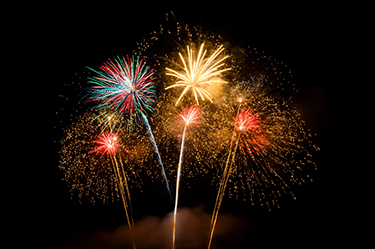Advising Clients on Fireworks Safety

Celebrating the Fourth of July often involves cookouts and fireworks – surely you’re familiar with that by now. While dogs might enjoy a burger fresh off the grill, fireworks often cause them to panic. The noise and flashes can terrify and spook an animal.
According to the American Humane Association (AMA), July 5th, the day following our nation’s holiday, marks the busiest day of the year for animal shelters. In an effort to protect the pets of your clinic, talk to clients about firework safety and the steps they can take to keep their animals safe.
Talking to Clients About Fireworks Safety for Their Pets
Noise
As a thunderstorm approaches, many animals become frightened and anxious, and their first instinct is to try to escape from the noise. Dogs that respond in this way suffer from noise phobias and anxieties. Fireworks create the same type of fear response, which is why so many dogs end up lost, injured, or even dead during this time of the year. When the need to flee from the noise takes over, dogs have been known to:
- Chew through wooden doors
- Break through screen doors or windows
- Run through glass patio doors or windows
- Chew through pipes in a bathroom
- Break through kennel, fencing, or dog crate
- Chew through rope or leash tethers
- Dig under fences
- Hide in small, enclosed spaces
The following tips will provide help to clients who need to control a pet suffering from noise phobia:
- Remember that the behavior is caused because the animal is scared and in a panic, it is not behaving out of disobedience
- Steps to help a pet maintain control:
- Distract the dog to take their mind off of the noise, for instance:
- Play a game
- Start a training session and use treats to reward
- Provide a calm environment
- Drape a blanket on the outside of their crate
- Find an alternate environment if animal is in an outside kennel, especially one with a metal roof
- Apply continuous pressure to their body by placing an arm around or by leaning against the dog
- Veterinary treatment options available:
- Anti-anxiety devices
- Pheromones
- Prescriptions
- Behavioral treatments and training
Hearing Damage
Clients who enjoy taking their pets everywhere with them need to be reminded that their pet’s hearing may be harmed by loud fireworks. Once the noise level reaches 85 decibels, hearing can be damaged. Fireworks are capable of exceeding 140 decibels. Without a way to offer protection against hearing loss, pets may be more comfortable when left at home.
Ingestion
Fireworks don’t have to be lit to pose a hazardous threat to animals. Many are made with substances that contain ingredients that are toxic when ingested, for example:
- Arsenic
- Potassium nitrate
- Heavy metals, such as:
- Barium
- Aluminum
- Lead
- Copper
- Strontium
The types of health problems caused from eating fireworks depends upon the type and the amount consumed. Animals commonly develop symptoms, such as:
- Vomiting
- Abdomen pain
- Bloody diarrhea
When large amounts of fireworks are consumed, dogs may suffer from:
- Shallow breathing
- Tremors
- Seizures
- Jaundice
- Acute kidney failure
- Changes to the bone marrow
If a pet likes the smell and taste, they will even find spent fireworks to eat. Following firework displays, recommend that clients monitor the areas where they walk and exercise as a means to limit their chance of exposure. Keeping the dog on a leash will help to steer them away from any trash left after fireworks have been set off.
Identification
Remind clients that one of the best steps they can take to ensure the safety of their pet is to provide a means of identification. Microchipping animals is as essential as providing properly affixed identification tags.
While firework displays are amazing to watch, dogs may find them frightening and something to run from. Advising clients to use common sense during this firework season may help to keep their pets safe.
Please contact your Covetrus representative at 855.724.3461 for additional methods for helping clients keep their pets safe!
Sources:
http://vetmedicine.about.com/od/doghealthfaqs/qt/Firework-Toxicity.htm
http://www.americanhumane.org/animals/adoption-pet-care/issues-information/holiday-issues.htmlNeed Regulatory Assistance
If you need help with regulatory or licensing issues, we're happy to help. We have a wide variety of resources to help you when issues arise.

Careers
Are you looking for a place to let your talents shine? At Covetrus, we help our practitioner customers better serve their patients and take pride in providing the best customer experience possible. Search our open positions to see our available opportunities.
Newsletter
Stay current with what’s going on with Covetrus, subscribe to receive our newsletter and email communications. Subscribers will receive the latest information in practice management, sales and marketing, animal health, and more.


Leave a comment